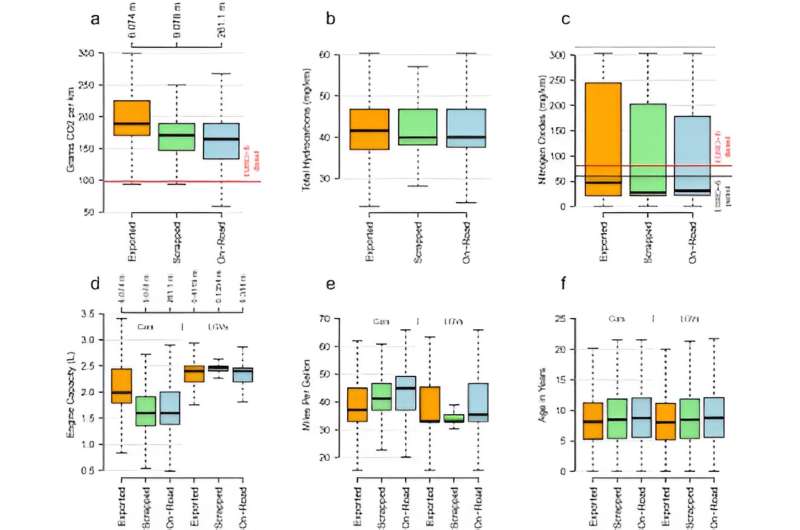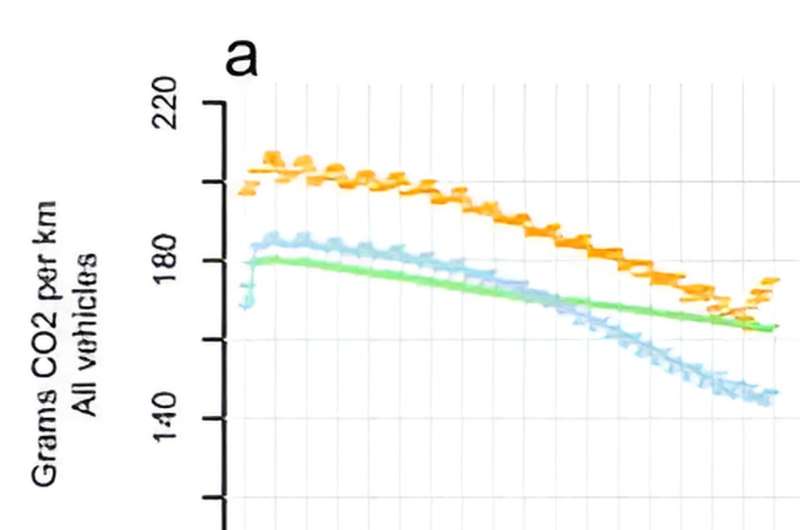
A new study published today in Nature Climate Change, found that exported used vehicles generate at least 13%–53% more emissions per mile than those that are scrapped or on the road in Great Britain.
The researchers used mandatory annual vehicle inspections—known as MOT tests—of all 65 million used vehicles on British roads between 2005 and 2021 to compare the pollution and emissions intensity of vehicles exported to those scrapped, destroyed, or driven in Great Britain.
The data revealed substantially higher rates of carbon dioxide and pollution generation in exported vehicles. Among the 7 million vehicles legally exported from Great Britain, exported used cars generated at least 13% more carbon dioxide per kilometer than scrapped cars, and 17% more than used vehicles on British roads. Exported vehicles were also 3.3 miles per gallon worse on fuel efficiency than those sent to the scrapyard.
Lead author Dr. Saul Newman, Research Associate at the Leverhulme Center for Demographic Science and Demographic Science Unit at Oxford Population Health said, “Our study reveals that the U.K., a leading global exporter of used vehicles with high vehicle emissions standards inside its own borders, offshores vehicle emissions to lower-income countries who are already suffering the most from climate change.”
More than half of all vehicle exports to low and middle-income countries originate from the EU and U.K., with virtually all remaining trade coming from Japan and the United States. While these countries maintain high emission standards domestically, almost all countries that receive their vehicle exports have no emission standards of their own.

Significantly higher nitrogen oxide rates—an air pollutant that causes millions of deaths each year and can be effectively avoided when emission standards are enforced—were emitted per kilometer from exported than scrapped cars. It was striking that almost all exported diesel cars (98%) failed the European Union’s EURO-6 diesel emissions standards for nitrogen oxide and carbon monoxide, and most (83%) were predicted to fail the carbon dioxide standards.
The study also highlights the issues surrounding the manipulation of emissions testing data which adds to the challenges of measuring emissions.
Dr. Saul Newman said, “This study shows that we have been exporting dirtier cars than those we send to the scrapyard. This presents an enormous opportunity to clean up emissions in lower-income countries, simply by applying our own domestic emission standards to vehicles sent offshore.”
The study calls for the U.K.’s world-leading vehicle emissions standards to be applied to all exported vehicles which would see cleaner instead of dirtier vehicles sent to lower-income countries. Such measures would reduce economic burdens of vehicle ownership as cleaner vehicles require lower ongoing maintenance and fuel costs, and align with increasing cleaner air and climate action calls.
Professor Melinda Mills, Director of the Leverhulme Center for Demographic Science and Demographic Science Unit concludes, “This study uses existing government data in a novel way to uncover considerable offshoring of vehicle emissions to low- and middle-income countries. The findings are striking and call for an evaluation of existing policies and practices around car pollution and exported vehicles.”
More information:
Offshoring Emissions through Used Vehicle Exports, Nature Climate Change (2024). DOI: 10.1038/s41558-024-01943-1. www.nature.com/articles/s41558-024-01943-1
Citation:
Study reveals UK offshore emissions through used vehicle exports (2024, February 20)
retrieved 20 February 2024
from https://phys.org/news/2024-02-reveals-uk-offshore-emissions-vehicle.html
This document is subject to copyright. Apart from any fair dealing for the purpose of private study or research, no
part may be reproduced without the written permission. The content is provided for information purposes only.







